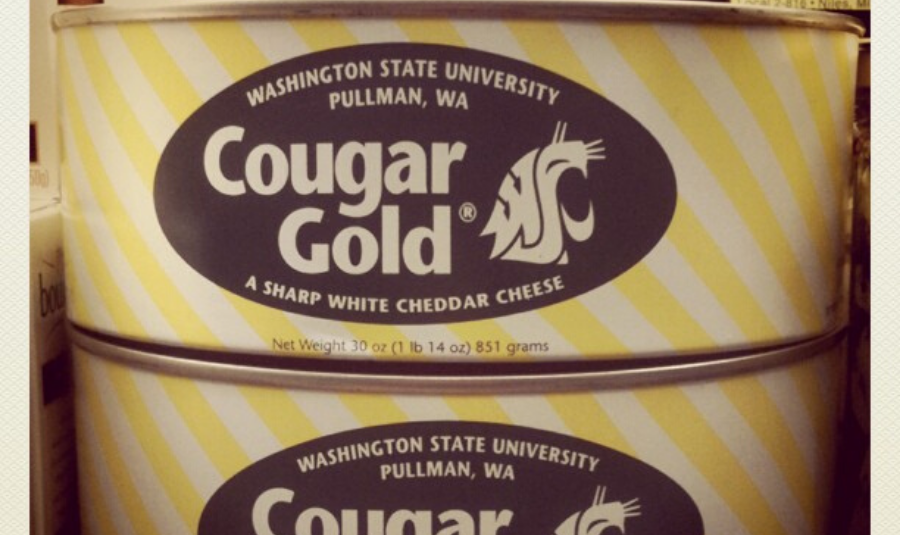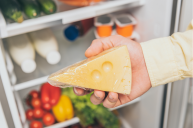When you hear "cheese in a can," there's a good chance you think of spray can cheese like Cheez Whiz. But outstanding canned cheese exists, and it's made by Washington State University Creamery.
Videos by Wide Open Country
Cougar Gold cheese is an aged white cheddar cheese that comes in a 30-ounce can. It's good cheese and its origin story is one of true American innovation, combining necessity with an invention and a partnership between a university, industry, and the government.
https://www.instagram.com/p/Bf4jU7HHjd3/
Aged cheese is usually stored wrapped in wax, which works to keep the cheese in perfect condition until you're ready to eat it. The problem is that if you plan to ship the cheese over long distances or keep it in rough conditions, the wax can crack and your perfect cheese can spoil or be contaminated before you have a chance to eat it. So in the late 1930s, Washington State University (which was Washington State College back then) started researching alternative ways to store cheese in their on-site Dairy Department and what they came up with was cheese in a tin can. It didn't take too long for the United States government to see the benefit in their research—especially with another World War looming on the horizon—and so they and the American Can Company funded the school's research into canned cheese.
Canned foods have the benefit of staying good for years, so the idea of storing cheese in a tin can makes sense. However, the thing that defines cheese also makes storing it in cans a bit of an issue. Cheese is cheese because good bacteria transform the milk by way of converting lactose into lactic acid. Bacteria doing their thing means that they emit carbon dioxide, but when you shut that carbon dioxide up into a small, tightly closed container like a can, you may find yourself with a dented container or even worse, an exploding can.
The WSU cheese team invented a way around this issue. N.S. Golding, a dairy husbandry professor at the school, came up with a plan: Add an additional bacteria, called "WSU19," to the cheese that would limit carbon dioxide production so that the cheese could safely be stored in cans. The idea worked and in 1948 the university creamery released the first cans of Cougar Gold cheese.
The additional bacteria had a side benefit of creating a unique cheddar cheese, one with a firm texture, almost crumbly, and a sharp but smooth taste. The Kitchn noted that the Cougar Gold cheese "is searingly sharp, but with such milky sweetness and mellow finish, it's a dynamic combination of flavors."
Cougar Gold cheddar in a can didn't become a military staple, which is probably why you haven't heard of this particular cheese. Even though it's canned, the product still requires refrigeration, and plastic packaging wasn't far behind it on the food timeline; that combination of factors meant that canned cheese never caught on widely.
However, the fact that canned cheese wasn't the answer to the U.S. government's needs didn't stop WSU from making the cheese. The cheese became popular enough for its unique taste that the university creamery still produces it today, along with nine other flavors of the Cougar Gold, all using the WSU19 culture. (The WSU Creamery also produces 20 flavors of ice cream, and really, who among us doesn't want to attend college there now?) In fact, the sharp cheddar has won several national and international awards
Today, the WSU Creamery is a self-sustaining part of the university. Students work in the creamery, gaining valuable hands-on experience in cheese production and the food science field. Revenue from the WSU Creamery goes back to creamery operations, including paying the students that work on the production floor and in the retail operation, and also for the educational support of the students studying food science.
Because it's a small operation, the best way to purchase it is a visit to WSU's Ferdinand's Ice Cream Shoppe or order it online (though there is a limit to how much you're allowed to order).
If you're lucky enough to snag some of the Cougar Gold cheese in a can, don't throw away the can once you're done! WSU has some great ideas on how to reuse the cans, including making a birdhouse, candle holders, and planters.




